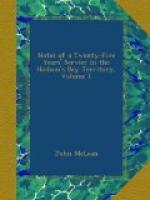These tribes clothe themselves with the skins of rabbits, and feed on their flesh; when the rabbits fail, they are reduced to the greatest distress both for food and raiment. I saw a child that remained naked for several days after its birth, its parents having devoured every inch of their miserable dress that could be spared from their bodies: it was at last swaddled in crow’s skins!
These two tribes generally live near the banks of the great rivers, and seem disposed to pass their pilgrimage on earth with as little toil, and as little regard to comfort, as any people in being. They pass summer and winter in the open air; they huddle together in an encampment, without any other shelter from the inclemency of the weather than what is afforded by the spreading branches of some friendly pine, and use no more fire than what is barely sufficient to keep them from freezing. Their wants are few, and easily provided for; when they have killed a few deer to afford them sinews for making rabbit-snares, they may be said to be independent for the remainder of the season. Their work consists in setting those snares, carrying home the game caught in them, eating them when cooked, and then lying down to sleep. A taste, however, for articles of European manufacture is gaining ground among them, and to obtain those articles a more active life is necessary, so that some tolerable fur-hunters are now to be found among them.
The Dogribs occupy the barren grounds that are around Great Bear Lake, and extend to the Copper-mine River. That part of the country abounds in rein-deer, whose skin and flesh afford food and raiment to the natives. They are a strong, athletic, well-formed race of Indians, and are considered more warlike than their neighbours, who evidently dread them.
None of the Indians who frequent the posts on McKenzie’s River have hereditary chiefs; the dignity is conferred by the gentlemen in charge of posts on the best hunters. On these occasions a suit of clothes is bestowed, the most valued article of which is a coat of coarse red cloth, decorated with lace; and, as the reward of extraordinary merit, a felt hat is added, ornamented in the same manner, with a feather stuck in the side of it. Thus equipped, the new-made chief sallies forth to receive the gratulations of his admiring friends and relatives, among whom the coat is ultimately divided, and probably finishes its course in the shape of a tobacco-pouch. In course of time, the individuals thus distinguished obtain some weight in the councils of their people, but their influence is very limited; the whole of the Chippewayan tribes seem averse to superior rule.




